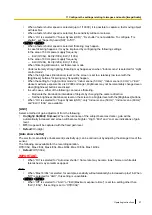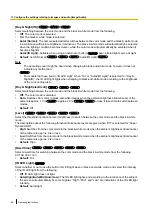
[Max bit rate (per client)*]
Select a H.264 bit rate per a client from the following. When “Best effort” is selected for “Transmission
priority”, set the maximum and minimum bit rates.
64kbps/ 128kbps*/ 256kbps*/ 384kbps*/ 512kbps*/ 768kbps*/ 1024kbps*/ 1536kbps*/ 2048kbps*/ 3072kbps*/
4096kbps*/ 8192kbps*
•
Default:
–
H.264(1): 4096kbps*
SW355
SF346
SF335
SW316L
SW316
SW314
SP306
SP305
SW155
SW152
SF135
SF132
SP105
NP502
/1536kbps*
SW352
SF342
SP302
SP102
–
H.264(2): 1536kbps*
* The range of bit rates that can be configured for the H.264 bit rates differs depending on the “Image capture
size”.
•
QVGA, VGA, 800x600
, 320x180, 640x360: 64kbps - 4096kbps*
•
, 1280x960
: 256kbps* - 8192kbps*
“Unlimited*” is available only when “Frame rate” is selected for “Transmission priority”.
Note
•
When “8192kbps*”
or “Unlimited*” is selected, the number of users who can access H.264 images
will be limited to “1”. (Only a single user can access H.264 images.)
•
The H.264 bit rate is restricted by “Bandwidth control(bit rate)” on the [Network] tab on the “Network”
page (
®
page 163). For this reason, the bit rate may be lower than the value when any value with an
asterisk (*) on the right is selected.
•
It is impossible to select “Unlimited*” for both “H.264(1)” and “H.264(2)”.
[Image quality]
Select the image quality of H.264 images from the following.
Low(Motion priority)/ Normal/ Fine(Image quality priority)
•
Default:
Normal
Note
•
When “Constant bit rate” or “Best effort” is selected for “Transmission priority”, this setting is available.
[Refresh interval]
Select an interval (I-frame interval; 0.2 - 5 seconds) to refresh the displayed H.264 images.
If using under a network environment with frequent error occurrences, shorten the refresh interval for H.264
to diminish image distortions. However, the refresh interval may be longer than the set value.
0.2s/ 0.25s/ 0.33s/ 0.5s/ 1s/ 2s/ 3s/ 4s/ 5s
•
Default:
1s
[Transmission type]
Select the transmission type of H.264 images from the following.
•
Unicast port (AUTO):
Up to 14 users can access a single camera concurrently. “Unicast port1(Image)”
and “Unicast port2(Audio)” will automatically be selected when transmitting images and audio from the
camera. When it is unnecessary to fix the port number for H.264 image transmission such as when using
in a particular LAN environment, it is recommended to select “Unicast port (AUTO)”.
•
Unicast port (MANUAL):
Up to 14 users can access a single camera concurrently. It is necessary to select
“Unicast port1(Image)” and “Unicast port2(Audio)” manually to transmit images and audio from the camera.
It is possible to fix the port number of the router used for H.264 image transmission via the Internet by
setting “Unicast port (MANUAL)” (
page 163). Refer to the operating instructions of the router in use.
•
Multicast:
Unlimited number of users can access a single camera concurrently. Complete the entry field
of “Multicast address”, “Multicast port” and “Multicast TTL/HOPLimit” when transmitting H.264 images with
multicast. Refer to page 9 for further information about the maximum concurrent access number.
•
Default:
Unicast port (AUTO)
Operating Instructions
83
11 Configure the settings relating to images and audio [Image/Audio]
















































